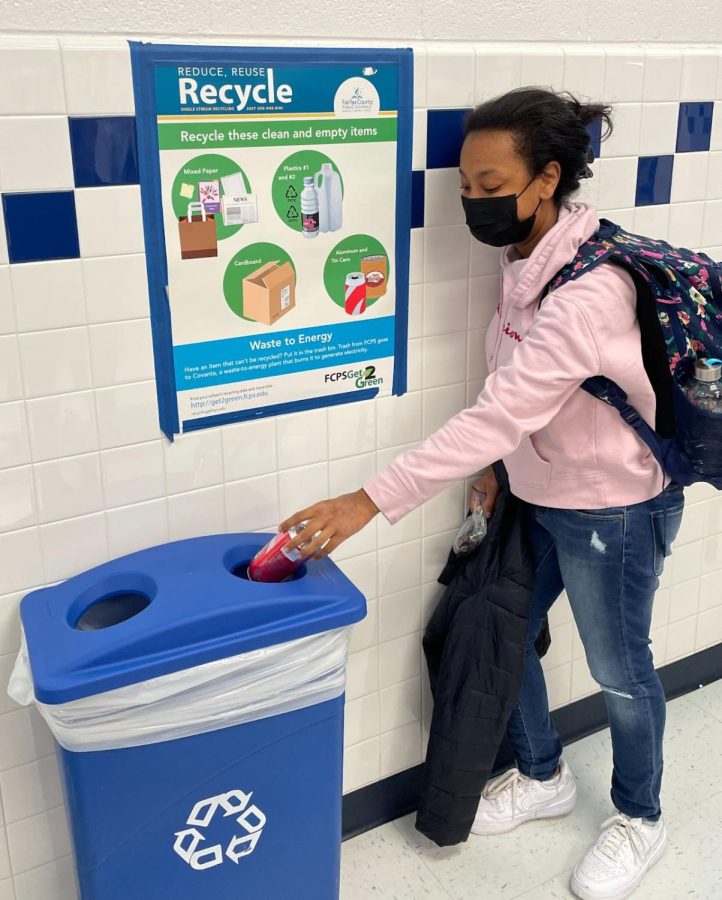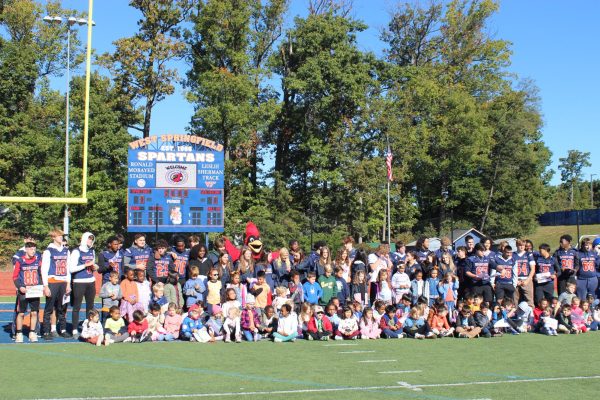Recycling procedures trashed
Photo courtesy of Jensen Kugler
Senior Bryer Haywood recycles a can in front of an FCPS “Get2Green” poster. As seen in the poster, our school does not recycle glass. Fairfax County, as a whole, however, does recycle glass. The nearest glass recycling location is the Springfield District Governmental Center, which is a short three minute drive from campus.
Chances are, students are recycling wrong, or don’t bother recycling at all. Even those who try to recycle correctly often experience confusion due to a lack of clear guidance. For example, not everyone knows that WS does not recycle all plastics.
According to FCPS’ most recent Recycling Guidelines, mixed paper, cardboard, plastics number one and number two, aluminum cans, and tin cans should be recycled. Unfortunately, schools can only recycle items that are properly disposed of. Recycling contamination occurs on a daily basis. Batches of recycling that contain food with other waste cannot be properly utilized and instead have to be destroyed.
Some checks are in place to prevent the neglect of recycling. For example, recycling is weighed at the Republic Services Material Recovery Facility.
“If the weight is off, [the facility] will contact plant operations to let them know that the weight is not what they normally get,” said Safety and Security Assistant and former Building Supervisor Russel Wade.
While ensuring the school does in fact recycle, this practice only goes so far. Recycling weigh-ins provide only minimal regulation and do little to help school custodians.
“We have twelve custodians dividing [up] the whole building, and each custodian [has] a section,” said Assistant Building Supervisor Douglas Gomez. “So each custodian [has the] responsibility to take care of the trash and [recycling] every day after school.”
On top of being solely responsible for managing all of the recycling and trash, custodians also oversee the upkeep of classrooms, hallways, and bathrooms within their assigned areas. With a student population of nearly 3,000, a staff of 274, and a three-level building, custodial responsibilities are no small task. Students improperly recycling adds yet another burden for custodians to deal with.
“For a custodian, it’s very hard to separate [the recycling and trash],” said Gomez. “[The students] don’t help us.”
Gomez has personal experience with this as a member of the custodial staff, particularly when food waste is involved. Food is present all over campus, but the cafeteria is an especially problematic area because the majority of students eat lunch there. Many would-be recyclables are incorrectly disposed of in the cafeteria.
“The reason we don’t put too many [recycling bins in the cafeteria] is that’s the [area with the most food],” said Gomez. “So what happens is the kids, they don’t separate [the recycling and trash].”
Recycling education for students is largely non-existent, leading them to lack important knowledge about their environmental impact. According to the World Wildlife Fund, plastic waste alone significantly pollutes Earth’s air, soil, and water. In addition, the high demand for paper results in illegal and unsustainable logging, presenting a serious danger to the world’s forests. By recycling, students and staff can decrease these negative occurrences and lessen the amount of waste in landfills.
The staff has also not been consistently informed on recycling procedures. 15.6% of 32 staff polled have no clear bags in their rooms, and another 15.6% have clear bags in all bins, suggesting that staff have not been well-briefed on bag-type significance. Black bags are treated as waste by the county, so when recycling is placed in black bags, none of it is actually recycled. Bags are not required for classroom use, but if used at all, clear plastic bags should be used for recycling and black bags should be used for trash.
Inconsistent school knowledge regarding recycling presents a striking contrast to the environmental policies FCPS has committed to. In July 2021, FCPS set a goal for carbon neutrality by 2040 and agreed to create a new instructional program regarding waste management, which would inform community members of proper recycling procedures.
Students have not seen any new instructional material regarding recycling since then. In fact, informational posters regarding recycling have been removed from much of the building.
“I wouldn’t be surprised if on other floors [the posters have] been torn down, just over time. I mean, you can see with the posters that they put up for clubs and stuff, they’ll last for a few weeks, but then [someone] rips them,” said environmental science teacher Austin Hollar.
Students can start by making small changes such as altering their daily habits and joining the Environmental Club. One significant yet small change students can make is making sure waste is placed in the correct bin. Doing so helps the earth we live on and the hardworking custodians who keep our school running. It may not seem like much, but it’s a start.
When finished with this paper, please recycle or reuse it. Do it for the planet, for the community, and because all it takes is a few extra seconds.






